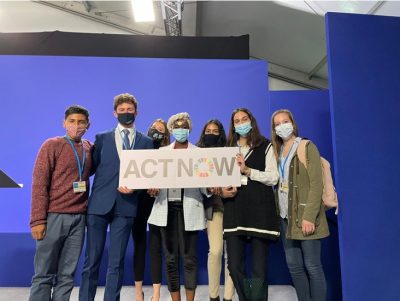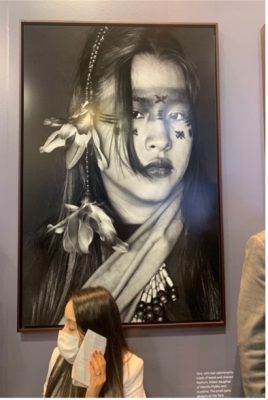by Lindsay Alfano, J.D. Candidate 2022
“The people making the decisions are not the ones who need the changes most on the ground.” The first small lecture I attended while at COP26 truly defined and transformed my experience moving forward. Emitithal Mahmoud, a Sudanese American slam poet and UNHCR Goodwill Ambassador, emphasized that voices from communities affected need to be heard especially when discussing sustainable goals and policy.

Following a probing question, she further stated that students are leaders and have the power to change the current political narrative. Everyone left that conversation asking themselves, “What am I doing now to make a difference?”
As a third-year law student, I was hoping that attending COP26 would expose me further to environmental law and strengthen my impact within this field. Particularly, I wanted exposure to individuals and the varying cultural perspectives they bring climate change. Ultimately, I gained great insight while at COP26 and was impactfully enlightened to the necessity of environmental justice, the role I play in amplifying and including individuals in conversations, and the impact of the legal field and necessity for policy reform.

Following the initial lecture, I focused on how the conference was working to include various individuals and advocate for environmental justice in COP26. The conference seemed to focus heavily on the involvement of and collaboration with women, youth, and indigenous people. On gender day, Fatou Jeng, an activist and founder of Clean Earth Gambia, brought to light the impact of climate change on agriculture in Gambia, a sector that women dominate, and how women in Gambia are disproportionately affected by climate change-based displacement. She found that women and girls should be at the center of the conversation. Another speaker stressed advocating for children because their future is dismal and argued that policy focused on the need for resiliency include children in the narrative and that the narrative reflect the severity of the situation. This same exposure was witnessed in a photograph taken by Sebastião Salgado capturing a young girl that lives in Kampo do Ruio Amônea Indigenous Territory, State of Acre. The photo seeks to show individual children who are impacted by illegal logging, gold mining, etc. Overall, the narrative of the conference seemed to encourage and demand amplifying a range of voices.
The attempt to integrate a range of voices was reflected in lectures and in a negotiation that worked to adjust law and policy. First, a panel of judges supported the necessity of collaborating with jurisdictions around the globe, continuing education on the effects of climate change, and protecting the human right to an environment that is not harmful. This discussion brought together several voices and the judges stressed the need for change. Second, in the negotiations to revise the Climate Tech Center and Network, there was a goal to add three seats to the board and provide a voice for three NGOs that focused on youth, women, and indigenous people. From a collaborative perspective, each of the countries seemed to be more than willing to work together despite the various backgrounds in the room. While appearing to support the amplification of these voices on the surface, there seemed to be push back from a few of the countries. This pushback did not accurately reflect the energy of the rest of the conference that was striving for inclusion, nor did it reflect the other countries that stressed the importance of these added seats at the table. In the end, the positions were included, but only the future can tell whether these three NGOs will actually have any power to influence and have a say in the decisions of the board.
To reflect back on the question from the first conference that I attended, I bring in a quote from the speaker at a talk led by the EPA who stated, “Now is the time to be an advocate and find any way to use your voice.” I am leaving the conference motivated to make a difference and advocate for those voices and stories that are often overlooked and undermined. As it has been stated, climate change is a human rights issue, and unless we begin to provide a platform for individuals to share their stories and a seat at the table for those left out of decision-making, we will never see true progress.